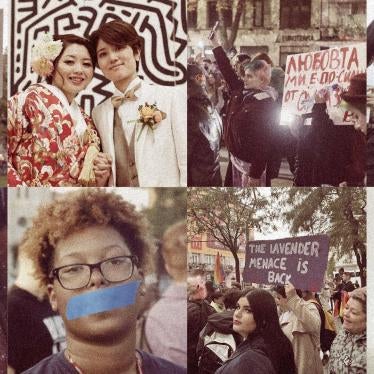Shuaib Chalklen
United Nations Special Rapporteur on Disability
Anand Grover
United Nations Special Rapporteur on the Right to the Highest Attainable Standard of Physical and Mental Health
Rashida Manjoo
United Nations Special Rapporteur on Violence against Women
Juan E. Méndez
United Nations Special Rapporteur on Torture and Other Cruel, Inhuman or Degrading Treatment or Punishment
Re: Involuntary sterilization of women and girls with disabilities
Dear Mr. Chalklen, Mr. Grover, Ms. Manjoo, and Mr. Méndez:
Human Rights Watch writes to urge you, in each of your respective mandates, to give immediate attention to the forced sterilization of women and girls with disabilities around the world. Together with our colleagues at the Open Society Foundation, Women with Disabilities Australia, and International Disability Alliance, we have published the enclosed briefing paper that outlines our key concerns and recommendations as part of the Stop Torture in Health Care campaign.
An alarming number of women and girls with disabilities have been, and continue to be, denied their rights to experience their sexuality, to have sexual relationships and to found and maintain families through the practice of forced sterilization. This denial also includes systematic exclusion from comprehensive reproductive and sexual health care, limited voluntary contraceptive choices, a focus on menstrual suppression, poorly managed pregnancy and birth, involuntary abortion and the denial of rights to parenting. In many instances, legal guardians or others make life-altering decisions for persons with disabilities, including consenting to sterilization on their behalf, further denying them their rights and dignity.
Human Rights Watch is deeply concerned these practices are occurring around the world, including in countries that have ratified the Convention on the Rights of Persons with Disabilities (CRPD). Indeed, the CRPD has specific provisions on the rightto found and maintain a family, the right toretain fertility, the right to legal capacity and the right to free and informed consent. The Committee on the Rights of Persons with Disabilities recommended “the abolition of surgery and treatment without the full and informed consent of the patient” in one of its first recommendations to a state party.
The Committee on Economic, Social and Cultural Rights has stated that forced sterilization of girls and women with disabilities is a breach of Article 10, protecting the family, of the International Covenant on Economic, Social and Cultural Rights.[1]The Committee Against Torture has recommended that States take urgent measures to investigate promptly, impartially, thoroughly, and effectively all allegations of involuntary sterilization of women, prosecute and punish the perpetrators, and provide the victims with fair and adequate compensation.[2]
The Committee on the Rights of the Childhas identified forced sterilization of girls with disabilities as a form of violence[3]and noted that State parties to the Convention on the Rights of the Child are expected to prohibit by law the forced sterilization of children with disabilities.[4]The Committee has also explained that the principle of the “best interests of the child” cannot be used to justify practices which conflict with the child’s human dignity and right to physical integrity.[5]
The Committee on the Elimination of Discrimination against Womenhas considered forced sterilization a violation of a woman’s right to informed consent, infringing on her right to human dignity and physical and mental integrity.[6]The Committee has clarified that except where there is a serious threat to life or health, the practice of sterilization of girls, regardless of whether they have a disability, and of adult women with disabilities in the absence of their fully informed and free consent, should be prohibited by law.[7]
In June 2011, the International Federation of Gynecology and Obstetrics (FIGO) issued new guidelines on female contraceptive sterilization and informed consent (see attached). These Guidelines explicitly state that ‘only women themselves can give ethically valid consent to their own sterilization. Family members including husbands, parents, legal guardians, medical practitioners and, for instance, government or other public officers, cannot consent on any woman’s or girl’s behalf.’
We respectfully ask you to consider this information in urging the governments to take immediate action to halt the involuntary sterilization of women and girls with disabilities and to address the broader problem of healthcare discrimination against women and girls with disabilities. Specifically, we call on you to:
- Gather information about practices of involuntary sterilizations against women and girls with disabilities during your country visits, including by raising questions to governments and through meetings with women and girls with disabilities themselves.
- Call on governments to develop national legislation prohibiting, except where there is a serious threat to life or health, the sterilisation of girls with disabilities, and of adult women with disabilities in the absence of their fully informed and free consent. Such legislation should developed in consultation with organizations of women with disabilities and other key stakeholders, and be consistent with the International Federation of Gynecology and Obstetrics (FIGO) Guidelines on Female Contraceptive Sterilization. It should include penalties or disciplinary measures for health providers who conduct sterilizations without consent.
- Urge governments to provide redress to women and girls with disabilities who have been sterilized without their consent.
- Urge governments to investigate whether forced sterilizations of women and girls with disabilities are occurring in their countries, and to identify patterns (such as higher vulnerability among marginalized groups within women and girls with disabilities).
- Raise awareness about the incidence and effects of forced sterilization against all women and girls with disabilities, and call on governments to increase awareness of this issue among the public and families of women and girls with disabilities. This should include requirements that health providers make medical files freely accessible to patients.
- Consider issuing a joint statement calling for the abolition of forced sterilization against women and girls with disabilities.
We greatly appreciate your attention to this critical issue and would be happy to provide any additional information that you may require.
Sincerely,
Shantha Rau Barriga
Disability Rights Researcher/Advocate
Human Rights Watch
[1]UN Committee on Economic, Social and Cultural Rights (CESCR Committee) General Comment No.5, para 31.
[2]UN Committee Against Torture (CAT Committee), Concluding Observations: Slovakia, para 14, U.N. Doc. CAT/C/SVK/CO/2(2009); Czech Republic, para 6(n), U.N. Doc.CAT/C/CR/32/2.
[3]UN Committee on the Rights of the Child (CRC Committee), General comment No. 13 (2011): Article 19: The right of the child to freedom from all forms of violence, 17 February 2011, CRC/C/GC/13, paras.16, 21.
[4]CRC Committee General Comment No.9, para 60.
[5]CRC Committee General Comment No. 13, para 61.
[6]Committee on the Elimination of Discrimination Against Women (CEDAW Committee) (1999), General recommendation No. 24: Article 12 of the Convention (women and health), A/54/38/Rev.1, chap. I, para 22.
[7]CEDAW Committee (2010) Concluding observations of the Committee on the Elimination of Discrimination Against Women: Australia. CEDAW Forty-sixth session, 12 – 30 July 2010. CEDAW/C/AUS/CO/7. See http://www2.ohchr.org/english/bodies/cedaw/cedaws46.htm







